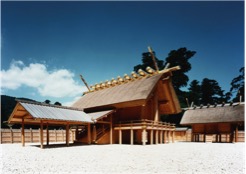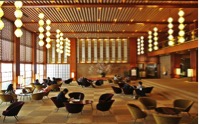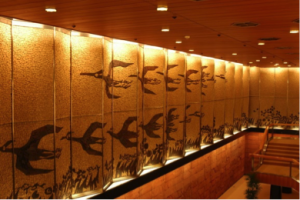How should we value history?
 In Japan, the most revered religious Shinto shrine, the Grand Shrine at Ise, was originally constructed in the seventh century. Every 20 years the shrine is torn down and rebuilt. The new shrine is constructed to look weathered and old, like the structure it replaced. Which raises the question, should we value the physical object or what that object represents? Architecture is one of the few human creations that defines space. A building bridges the gap between artifact and tool, and imposes an environment on its user. These buildings, these contrived spaces we create, serve us as a tool, but also reflect us as culture. So how do we value these things we create? Is a building/space experience unique to the age of its envelope?
In Japan, the most revered religious Shinto shrine, the Grand Shrine at Ise, was originally constructed in the seventh century. Every 20 years the shrine is torn down and rebuilt. The new shrine is constructed to look weathered and old, like the structure it replaced. Which raises the question, should we value the physical object or what that object represents? Architecture is one of the few human creations that defines space. A building bridges the gap between artifact and tool, and imposes an environment on its user. These buildings, these contrived spaces we create, serve us as a tool, but also reflect us as culture. So how do we value these things we create? Is a building/space experience unique to the age of its envelope?
 I was privileged to study Japanese architecture under Botand Bognar, Professor and Edgar A. Tafel Endowed Chair in Architecture at the University of Illinois. Japanese architects have adapted all types of modern design and construction materials to create some of the most unique buildings in the world. Maybe because space is so valuable in a crowded country, their focus has been the relationship between a person and their surroundings. The Japanese embrace change like few other cultures. Any fan of electronic gadgets knows that Japan is ahead of the curve on incorporating the newest technology into their lives. Even personal change is treated differently, and many see the Japanese as generally unsentimental. Some Japanese families will even hire actors to portray lost grandparents at family events. They realize that we are all just moving through space and time, and it is the experience of the path we should embrace – not the path.
I was privileged to study Japanese architecture under Botand Bognar, Professor and Edgar A. Tafel Endowed Chair in Architecture at the University of Illinois. Japanese architects have adapted all types of modern design and construction materials to create some of the most unique buildings in the world. Maybe because space is so valuable in a crowded country, their focus has been the relationship between a person and their surroundings. The Japanese embrace change like few other cultures. Any fan of electronic gadgets knows that Japan is ahead of the curve on incorporating the newest technology into their lives. Even personal change is treated differently, and many see the Japanese as generally unsentimental. Some Japanese families will even hire actors to portray lost grandparents at family events. They realize that we are all just moving through space and time, and it is the experience of the path we should embrace – not the path.
 So it is no surprise that the Japanese are demolishing a few buildings that we would preserve. It’s nothing new; in 1968 they demolished Frank Lloyd Wright’s Imperial Hotel. The hotel survived major earthquakes and the WWII, and they tore it down to put up a modern office building. Recently they tore down the Hotel Okura built in 1962 for the ‘64 Tokyo Olympics. A real life “Mad Men” experience, the building will likely be replaced by a generic glass office building, and nobody in Tokyo will think twice about the loss. The hotel hosted celebrities, presidents, and world leaders during its life. Like us, the building is simply serving its purpose along a path.
So it is no surprise that the Japanese are demolishing a few buildings that we would preserve. It’s nothing new; in 1968 they demolished Frank Lloyd Wright’s Imperial Hotel. The hotel survived major earthquakes and the WWII, and they tore it down to put up a modern office building. Recently they tore down the Hotel Okura built in 1962 for the ‘64 Tokyo Olympics. A real life “Mad Men” experience, the building will likely be replaced by a generic glass office building, and nobody in Tokyo will think twice about the loss. The hotel hosted celebrities, presidents, and world leaders during its life. Like us, the building is simply serving its purpose along a path.
